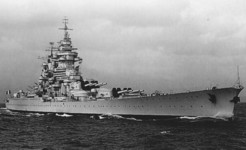|
Political
|
|
|
|
Naval
|
| 1919
- Treaty of Versailles
- Under its provisions, Germany was to be disarmed,
the Rhineland occupied and reparations paid. At this
time Poland was recreated from parts of Germany and
Russia, as were other Central European states out of
the Austro-Hungarian Empire. Japan was given a mandate
over the ex-German islands in the Pacific.
The League of Nations was
formed.
|
|
|
|
1921-22
- Washington Naval Treaty -
Britain, United States, Japan, France and Italy agreed
to limit the displacement and main armament of capital
ships, aircraft carriers and cruisers, and total
tonnage and age of the first two categories.
|
1922
- Benito Mussolini
and his Fascist Party came to power in Italy.
|
|
|
|
1922
- Japanese
carrier Hosho completed.
|
1926
- The German
Weimar Republic joined the league of Nations.
|
|
|
|
1927
- Geneva Naval
Conference failed to reach agreement on total
tonnage of cruisers, destroyers and submarines.
Major warships
completed - British battleships Nelson and
Rodney, French carrier Bearn, US carriers Lexington
and Saratoga, and Japanese carrier Akagi".
1928
- Japanese
carrier Kaga completed.
|
| 1930
- Following
the Wall Street Crash of 1929 the world moved
into major economic depression.
1931 -
An
incident in the Chinese province of
Manchuria led
to the Japanese
invasion which was completed by early 1932. The
puppet state of Manchukuo was declared. By then
Japanese forces had taken control of the Shanghai
area in further fighting.
|
|
|
|
1930
- London Naval Treaty
- Britain, US and Japan agreed on total tonnage,
tonnage and armament limitations for cruisers,
destroyers and submarines. Also that no new capital
ships were to be laid down until 1937. Neither France
nor Italy were signatories. |
1933
- Following earlier Nazi Party election successes, Adolph
Hitler became Chancellor of Germany in January.
He took the country out of the League of Nations later
in the year, by which time the Japanese had already
walked out over the Manchurian issue.
|
|
|
|
1933
- Major warships
completed - German pocket battleship Deutschland
and Japanese carrier Ryujo.
|
| 1934
- Russia joined
the League of Nations.
Meanwhile Hitler
consolidated his power and in August proclaimed
himself Fuehrer.
|
|
|
|
1934
- The 1932 Geneva Disarmament Conference
finally broke down and Japan announced its intention
to withdraw from the 1922 and 1930 Naval Treaties when
they expired in 1936. Planning started on the giant
battleships of the Yamato class.
Major warships
completed - US carrier Ranger and German
pocket battleship Admiral Scheer.
|
| 1935
March - Hitler
introduced
military conscription.
April - The United
States passed the Neutrality Act forbidding the
supply of arms to belligerents in the event of war.
October - Following
border disputes between Italian Somaliland and
Abyssinia, Italy invaded. League of Nations
sanctions had little effect and by May 1936 the
country had been taken over by Mussolini's forces.
|
|
|
|
1935
June - Anglo-German
Naval Agreement - Germany was allowed to
build a fleet up to 35% of British total tonnage and
45% of submarines. Parity in numbers of submarines
was allowed if notice was given.
|
| 1936
March - German
troops were sent to reoccupy
the Rhineland.
July - The
Spanish Civil War
started;
Italy and Germany became aligned with one side and
Russia with the other.
|
|
|
|
1936
November - London
Protocol -The major powers including Germany agreed
to prohibit unrestricted submarine warfare against
unarmed ships.
December -The
1922 and 1930 Naval Treaties were allowed to lapse
and the major powers moved towards rearmament. In
Britain this effectively started with the 1936/37
Estimates.
Completed - German
pocket battleship Admiral Graf Spee.
|
| 1937
July - Further
incidents in China
this time near Peking,
led to Japan
extending its hold over northeastern
China and the major port areas by the end of 1938.
|
|
|
|
1937
Major warships
completed - French battlecruiser Dunkerque, US
carrier Yorktown, Japanese carrier Soryu. Italian
battleships Littorio and Vittorio Veneto were
launched.
|
| 1938
March - German
troops marched into and annexed
Austria.
September - In the
Munich Crisis, Czechoslovakia
was forced to cede Sudetenland to Germany.
|
|
|
|
1938
Germany drew up the major
naval rearmament programme, the 'Z' plan, to
bring the Navy closer to equality to Britain by the
mid-1940s.
Major warships
completed - British carrier Ark Royal, French
battlecruiser Strasbourg, German battlecruiser
Gneisenau, and US carrier Enterprise. (German
carrier Graf Zeppelin was launched but never
completed.)
|
| 1939
March - Germany
completed its
occupation of Czechoslovakia
and took back Memel
on the Baltic coast from Lithuania. Now Britain and
France guaranteed Poland's independence.
The Spanish Civil War
came to an end.
April - Italy
invaded Albania.
May - Britain
reintroduced military conscription. Germany and
Italy joined forces in the Pact of Steel.
August - Following
secret negotiations the Russian-German
Non-Aggression Pact was signed in Moscow to the
world's amazement. Its provisions included the
dismemberment of Poland.
1st September
- Germany invaded Poland.
|
|
|
|
1939
April - Germany
abrogated the 1935 Anglo-German Naval Agreement.
June - The Reserve
Fleet of the Royal Navy was manned.
August - Full
mobilisation of the Royal Navy was ordered and the
Admiralty took control of all merchant shipping.
German
U-boats and two pocket battleships sailed for
their war stations in the Atlantic.

Major warships
completed to 3rd September 1939 - German
battlecruiser Scharnhorst and Japanese carrier
Hiryu. Launched in the same period - British
battleships King George V, Prince of Wales, fleet
carriers Illustrious, Formidable, French battleship
Richelieu (above - Maritime Quest), German
battleships Bismarck and Tirpitz, Japanese carrier
Shokaku and US carrier Wasp
|
|
return
to inter-war, 1918-1939
or to
Naval-History.Net
revised
4/9/11
|
|
|